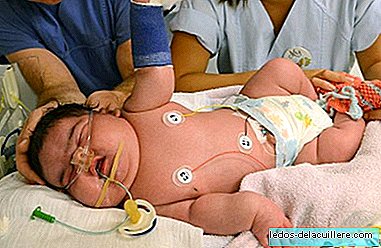
As every Friday comes our section: Ask the midwife. In it, the midwife Marina Fernández every week will answer a question that our readers have left for her.
This week we have chosen a question that, for moms who see the time of childbirth approaching, usually worries: should they run to the hospital when the bag is broken and will cause them to be delivered immediately for it?
Marina Fernandez She is a midwife, specializing in home birth, a lactation consultant and an expert in complementary therapies. She is a member of the Professional Association Born at Home and a founding partner of Multilacta.Each week he will collaborate with Babies and more by answering a question from our readers. You can know her better on her Marina Matrona page.
The question we have selected is that of Nene-nenita, this is:
Two questions that worry me because I'm almost done: If you break the bag, do you go to the hospital immediately? I understand that if you do not go into labor within 12 hours, they will induce labor ... :( And another ... I have been told that I am at risk of uterine rupture because my previous pregnancy ended at 26 weeks in an emergency caesarean section. Natural, any advice, recommendation? How do I know if the breakage is occurring?
Midwife Marina Fernández answers the first question; the other we will leave for another week given its interest and complexity.
"Approximately 10% of full-term pregnancies begin labor with premature rupture of membranes. We will talk about this case, assuming your pregnancy is more than 37 weeks.
It is identified because a clear liquid comes out of your vagina. It can be an amount that does not make you doubt, clearly all your clothes have been wet, or they can be a few drops and you do not know how to differentiate what happens, if the pee has escaped, or you have broken the bag. There is a test that is practiced in the hospital, which differentiates these two transparent liquids (amniotic fluid and urine), but at home ... Let's see how they can be differentiated:
Amniotic fluid smells like semen. Urine has another characteristic smell. The flow, which can also be very abundant and liquid in these last weeks of pregnancy has another different smell and creamy consistency that clearly differentiates it.
You can sit in the toilet and pee. Then you put a small towel on your panties and put them on. Better not be a compress so you can feel moisture. It can also be a piece of paper, if it catches you in a place where you don't have a washcloth handy. Then you breathe calmly a couple of times. You inspire and keep the air in your lungs, at the same time, with your hands you squeeze the abdomen. Repeat this operation 4-5 times and wait 30 minutes, you will see how the towel is. If it is wet, it means that the amniotic bag is broken, if on the contrary it is dry, it means that the pee has escaped a little.
It is important to differentiate the liquid that has wet your clothes, to act accordingly. If it is the bag, which has been broken, the risk you can run is to have an infection of the amniotic fluid, that's why it is recommended that you go to the hospital and wait a short time to induce labor.
The conditions under which we can expect labor to begin spontaneously are:
- The liquid is light in color; If it is not so and it is greenish, it is because there is meconium and in that case you should go to the hospital right away.
- You don't have a fever: you should check your temperature every 8 hours and if it goes up from 37ºC go to the hospital.
- Notes the movements of your baby. If possible, you should listen to your heart rate every day.
- No vaginal exams have been performed. Once a scan is done, germs have crawled from your vagina and the risk of infection appears.
It is known that if 24 hours are expected, 70% of women have started labor. And in 48 hours, 90%.
Hospital protocols, in Spain, do not normally wait as long and propose immediate induction, or at 12 hours after the rupture of membranes. Once you have gone to the hospital, and you have had a vaginal touch, the waiting time is shortened because it is advisable to induce labor within the next 12 hours.
At the San Carlos Clinical Hospital in Madrid, a pioneering study was conducted (Emilio Santos, Michel Odent, Birth, 2005) that showed that fear before delivery is a factor that predisposes for the bag to break. The study was conducted following the terrorist attack that occurred in Madrid on March 11, 2004.
There is also another factor that contributes to the breakage of the bag, and it is the low intake of zinc that the pregnant woman takes. To women who broke the amniotic bag before starting labor, I recommend that in their next pregnancies some supplement of this mineral to help it not occur again.
The other question about vaginal birth after caesarean section, I think is important enough to answer next week. "
We hope that the response of midwife Marina Fernández be useful and remember, you can continue sending your questions in the comments to this article, so that she can answer one next Friday.












